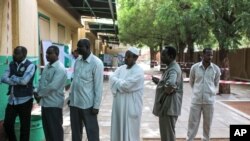With few voters turning out at polling stations in Sudan's capital Monday and opposition parties boycotting the general elections, it was all but certain President Omar al-Bashir would win another term.
In the midst of a swirl of news cameras pushing and elbowing for position, Bashir cast his vote at the St. Francis School polling station in Khartoum. The 71-year-old leader moved from the registration table to the voting booth, then paused for the cameras before dropping his ballot into a plastic bin.
Apart from this public display, it was hard to tell it was election day in the capital.
Monday, the first of three days of voting, was declared a national holiday, but at midday there were few voters to be found at polling stations.
At a quiet primary school in the Imtidad Nasser neighborhood of Khartoum, at least one loyal Bashir supporter, schoolteacher Amina Mohamed, was excited for the vote.
'There is enthusiasm'
“Yes there is enthusiasm about the elections,” Mohamed said. “And today is a holiday. Hopefully. it [the elections] will be free and fair as people expect them to be."
Bashir, who is wanted by the International Criminal Court on war crimes charges, is running virtually uncontested, as the main opposition parties have boycotted the election, complaining about political oppression in the country.
The inevitable outcome of the vote is contributing to some apathy across Khartoum.
Just 200 meters from the Imtidad Nasser voting station, Ibrahim Mohammed sits and has tea with a few friends next to a small kiosk.
Unemployed and disgruntled, Mohammed has no interest in this election.
“Why would I vote? I’m not benefiting from this government,” he said. “We don’t even know who the candidates are. We only know Bashir and he’s going to win either way. It’s just a waste of money and time.”
Despite the low turnout, Bashir and his National Congress Party have been gaining popular support due to improved ties in the region, exemplified by a deal with Egypt and Ethiopia to share Nile River resources.
The West continues to isolate Sudan for the country’s poor human rights record. Another point of contention is the government’s backtracking on a national dialogue with the opposition, armed groups and civil society to resolve internal conflicts.
EU drops support
The European Union dropped its support for the vote, saying without dialogue the “elections cannot produce a credible result.”
Speaking to journalists outside St. Francis Monday, presidential adviser Ibrahim Ghandour emphasized that other regional monitors are on the ground.
“Other friends and international organizations who are observers to elections elsewhere are here. We hope that the EU will revisit its decision, otherwise it's up to them, we are continuing our elections with the support of our people," Ghandour said.
Observers from the African Union, the Arab League and the East African bloc IGAD are among the monitors watching the vote.
